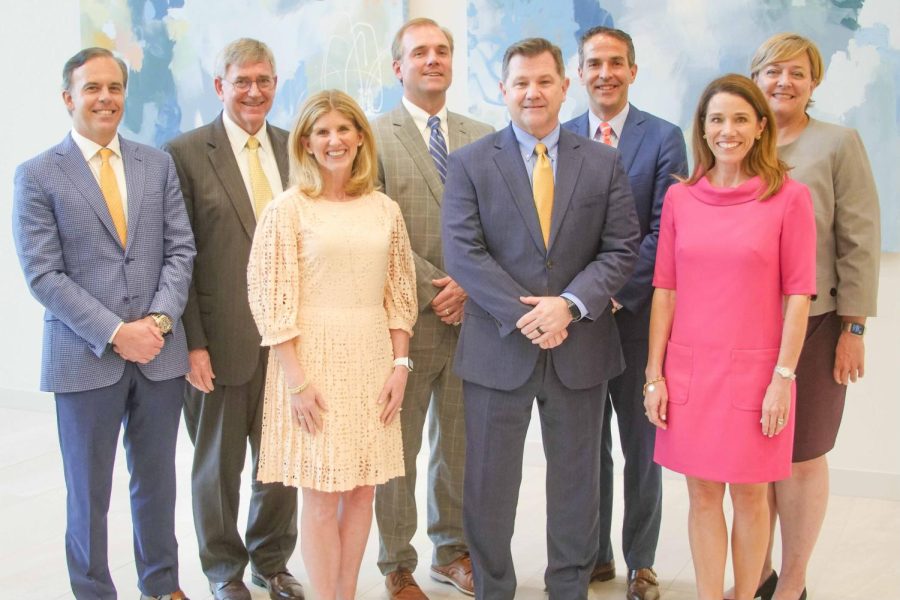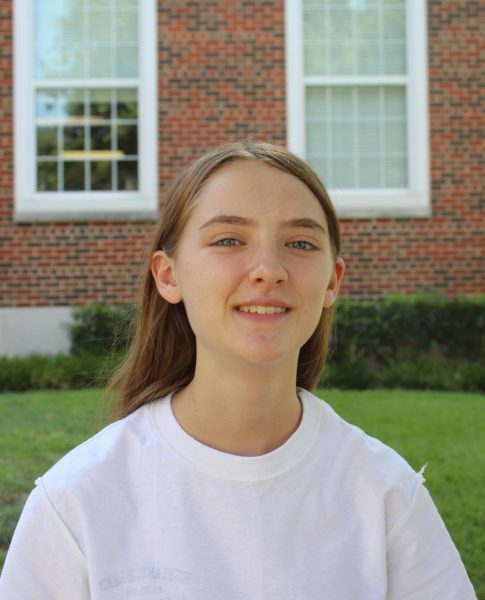The time is 5 p.m. on Oct. 14, 2014.
When School Board President Leslie Melson calls the meeting to order at 5:01, over 300 people crowd the auditorium at John S. Armstrong Elementary School.
Some parents carry books and read aloud passages with sex scenes and explicit language. Others wear orange ribbons and buttons protesting censorship.
Every parent is here to present their stance on the district’s latest hot-button topic: books in school.
It’s been six years since that meeting, and the school board has dealt with many other challenges since then. Some of the trustees dealing with these challenges are school board vice-president Stacy Kelly and president Tom Sharpe.
Kelly has been serving the school board since 2017 and has been serving as Vice President Place 6 since the 2021-2022 school year. Tom Sharpe has also been serving the school board since 2017 and was elected to serve as President Place 7 in 2021. Now, their terms have expired, and both of them are retiring.
“I think that the issue is there are a lot of things that people now feel are under the authority of the school board that they didn’t care about five years ago,” Sharpe said. “There’s been a heightened focus on ‘what is my school doing and do I agree with it or am I opposed to it?”
As parents and community members take an increased interest in what their children are doing in school, each with their ideas for improving upon the curriculum, views often conflict with another.
“There are often competing perspectives between staff, students and parents,” Kelly said. “All of them want to help in different ways, but our job is to put students in the center of all of that and deliver a quality education.”
One aspect of education often addressed by parents seeking change is concerns with what books should and shouldn’t be taught in the classroom.
“Look, do I think that there is material that should not be put in front of middle school and high school students?” Sharpe said. “Absolutely. I do think there are some parameters and certain literature that’s available in the world is outside those parameters. More than one book can be effectively used to teach a class.”
Back in September 2014, Superintendent Dawson Orr banned seven books from classroom instruction, including The Working Poor by David K. Shipler, The Art of Racing In The Rain by Garth Stein, as well as Glass Castle: A Memoir by Jeannette Walls, who was scheduled as the keynote speaker for Litfest 2015 in February. The books were cited as inappropriate due to sexual content and references to rape, abuse, abortion and discrimination.
“That was actually the year before right before I came,” English teacher Brent Nuss said. “As a result of the book removals, seven teachers quit. Now, the only teachers left from that year that got hired after the previous teachers left are me and [Melissa] Reed.”
This led to a complete restructuring of the district’s book approval process and created a precedent for how books are reviewed before approval.
“I think that was good because it created more transparency for parents to make decisions and helped our staff to make certain that they were selecting books that were teaching the curriculum effectively,” Kelly said.
Nuss explains that as parents struggle with this loss of control over their children’s lives as they grow older, teachers can often be blamed.
“I think being a teacher, you’re seen in a hostile perspective from a parent, typically because you’re the only other adult that sees [the student] on a regular basis that has influence over them,” Nuss said. “I think many parents can look at teachers as a threat, whether it’s subconscious or conscious, and feel like if the child is raised where their values don’t align with the school’s, that’s something bad.”
Another issue that plagued the school board in recent years is COVID-19. The school board was besieged with questions about mask policies, creating a split between parents who insisted their kids needed masks removed in order to learn and parents who believed the opposite.
“We had two very understandable opinions that were opposed to each other,” Sharpe said. “And it may be impossible to put those two together in a satisfying way.”
Much of this COVID-19 conflict can be attributed to the ongoing battle between teachers and parents regarding who should have control over what happens inside the school building. It was a matter of where parental rights stopped, and rights of the educators started.
“Ultimately, the parent has responsibility for the child,” Sharpe said. “Including whether that child attends HPHS or moves to Plano or Oklahoma or private school.”
As for the direction that the school board is heading, nobody can be completely sure. The next general election for the open school board positions is May 6.
“I think if you look at the trend of other districts around here, especially districts that reflect the affluence of this one, it’s showing you a direction that’s a little concerning,” Nuss said. “Especially for English teachers.”




